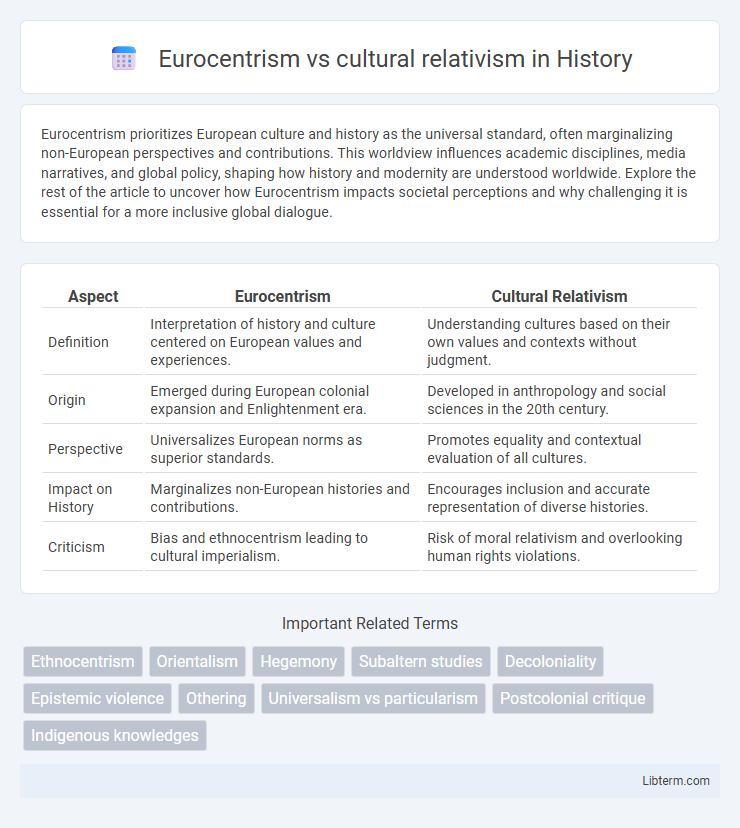Eurocentrism prioritizes European culture and history as the universal standard, often marginalizing non-European perspectives and contributions. This worldview influences academic disciplines, media narratives, and global policy, shaping how history and modernity are understood worldwide. Explore the rest of the article to uncover how Eurocentrism impacts societal perceptions and why challenging it is essential for a more inclusive global dialogue.
Table of Comparison
| Aspect | Eurocentrism | Cultural Relativism |
|---|---|---|
| Definition | Interpretation of history and culture centered on European values and experiences. | Understanding cultures based on their own values and contexts without judgment. |
| Origin | Emerged during European colonial expansion and Enlightenment era. | Developed in anthropology and social sciences in the 20th century. |
| Perspective | Universalizes European norms as superior standards. | Promotes equality and contextual evaluation of all cultures. |
| Impact on History | Marginalizes non-European histories and contributions. | Encourages inclusion and accurate representation of diverse histories. |
| Criticism | Bias and ethnocentrism leading to cultural imperialism. | Risk of moral relativism and overlooking human rights violations. |
Introduction to Eurocentrism and Cultural Relativism
Eurocentrism centers European cultural norms and values as universal standards, often marginalizing non-European perspectives and knowledge systems. Cultural relativism advocates understanding and evaluating cultures based on their own contexts and values, promoting respect for cultural diversity without ethnocentric bias. This contrast highlights challenges in global discourse, where dominance of Eurocentric views can undermine the legitimacy of alternative cultural interpretations and epistemologies.
Defining Eurocentrism: Origins and Key Concepts
Eurocentrism originates from a historical perspective that centers European culture, history, and values as the primary or superior framework for understanding the world. Key concepts include the assumption of European cultural dominance, the marginalization of non-European societies, and the portrayal of European civilization as the universal standard. This worldview influences academic disciplines, international relations, and cultural narratives by prioritizing European experiences and knowledge systems over others.
Understanding Cultural Relativism: Foundations and Principles
Cultural relativism is grounded in the principle that beliefs, values, and practices must be understood within their own cultural context rather than judged against external standards. This framework challenges Eurocentrism by promoting the idea that no culture is inherently superior, emphasizing respect for cultural diversity and opposing ethnocentric biases. Key foundations include the recognition of cultural norms as inherently valid within their societies and the pursuit of objectivity in anthropological and sociological research.
Historical Context: Eurocentrism in Global Narratives
Eurocentrism shapes global narratives by prioritizing European history, values, and perspectives, often marginalizing non-European cultures and contributions. This bias emerged during the colonial era, when European powers imposed their worldview as universal, overlooking diverse cultural contexts. Cultural relativism challenges these narratives by emphasizing the importance of understanding societies within their own historical and cultural frameworks, promoting a more inclusive and balanced interpretation of history.
The Impact of Eurocentrism on Education and Academia
Eurocentrism in education often marginalizes non-Western knowledge systems, leading to a curriculum centered predominantly on European history, philosophy, and scientific achievements. This skewed representation limits critical engagement with diverse cultural perspectives and reinforces a hierarchy that privileges Western epistemologies. Challenging Eurocentrism requires integrating cultural relativism, which promotes the validation of multiple worldviews and creates a more inclusive academic environment that respects global intellectual diversity.
Cultural Relativism in Anthropological Research
Cultural relativism in anthropological research emphasizes understanding cultural practices and beliefs within their own contextual framework, avoiding ethnocentric judgments rooted in Eurocentrism. This approach prioritizes the intrinsic values and social norms of diverse societies, enabling more accurate and respectful interpretations. By challenging the dominance of Western perspectives, cultural relativism fosters a comprehensive analysis of human behaviors across global cultures.
Challenges and Critiques of Eurocentrism
Eurocentrism faces significant critiques for promoting a biased worldview that marginalizes non-Western cultures and historical narratives, often leading to cultural misrepresentation and intellectual dominance. This perspective undermines cultural relativism by dismissing diverse cultural values and knowledge systems as inferior or irrelevant. Scholars argue that overcoming Eurocentrism requires embracing cultural relativism to foster genuine intercultural understanding and decenter Western paradigms in global discourse.
Limitations and Controversies Surrounding Cultural Relativism
Cultural relativism faces limitations such as its potential to justify harmful practices by insisting that all cultural norms are equally valid, which can impede universal human rights enforcement. Critics argue that it lacks clear criteria to evaluate moral issues, causing ethical paralysis when cultural values conflict. This controversy highlights tension between respecting cultural diversity and addressing behaviors that violate fundamental human rights standards.
Eurocentrism vs Cultural Relativism: Comparative Analysis
Eurocentrism centers Western values and history as universal benchmarks, often marginalizing diverse cultural perspectives, while cultural relativism emphasizes understanding beliefs and practices within their specific social contexts. Eurocentric frameworks tend to impose hierarchical judgments that prioritize European narratives, contrasting sharply with cultural relativism's commitment to cultural equality and contextual interpretation. This comparative analysis reveals how Eurocentrism can perpetuate cultural dominance, whereas cultural relativism fosters inclusivity and respect for cultural diversity.
Toward a More Inclusive Global Perspective
Eurocentrism often frames global history and culture through a Western lens, marginalizing diverse worldviews and knowledge systems. Cultural relativism promotes understanding and valuing cultural differences on their own terms, fostering respect for non-Western traditions and practices. Embracing cultural relativism in global discourse encourages a more inclusive perspective that acknowledges multiple narratives and challenges hegemonic Eurocentric biases.
Eurocentrism Infographic

 libterm.com
libterm.com